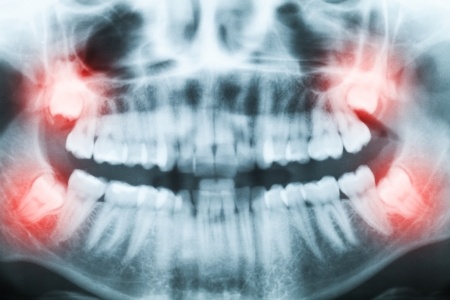Wisdom Teeth Removal
Wisdom teeth, also known as third molars, get their name by being the last teeth to come in during young adulthood. As part of your general dental visit, our dentists at Burpengary Dental will examine you to determine if your wisdom teeth are healthy and properly positioned.
Important facts
- Wisdom teeth usually erupt between 18-20 years of age.
- Removal of wisdom teeth is a very common procedure.
- They are commonly associated with becoming impacted when the jaw is crowded and there is no space to erupt successfully.
It is best to have wisdom teeth removed while the patient is young, as in younger people the roots have not formed totally and the bone surrounding the tooth is softer.

F.A.Q.
Do I need my wisdom teeth removed?
All patients are unique, however in general wisdom teeth may need to be removed when there is evidence of changes in the mouth such as:
Pain
Pressure from the wisdom tooth may cause pain in the tooth next to it. Pain can also be caused by infection around the wisdom tooth.
Infection
When an impacted wisdom tooth starts to push through the gum, an infection can start around the top of the tooth. Infection and inflammation (swollen, red gums) can cause pain, swelling, and jaw stiffness. The infection can cause bad breath and an unpleasant taste. Swallowing may be painful. You may feel generally unwell.
Crowding
A wisdom tooth may push nearby teeth out of their correct position.
Cyst
If a wisdom tooth is not removed, a sac of fluid called a cyst can form around the tooth and may displace the tooth. The cyst can destroy bone and damage other teeth and the gums. Cyst formation around unerupted teeth is fairly common.
Ulcer
An upper wisdom tooth may push sideways out of the gum. It may cause an ulcer where it rubs against the inside of the cheek.
A Food Trap
Food becomes trapped between the wisdom tooth and the molar next to it. This can cause cavities in both teeth.
Resorption Cavity
An impacted wisdom tooth may keep pushing against the molar next to it. This can cause a resorption cavity where the wisdom tooth hits the other molar. This often leads to serious damage to both teeth. The molars may become infected or abscessed. Removal of both molars is often needed.
What can I expect immediately after treatment?
After the tooth or teeth have been removed, you will have to rest for a while before you go home. The dentists at Burpengary Dental will check on you as you recover.
What should I do at home to take care of myself?
- Rest at home after the procedure.
- Do not drink alcoholic drinks or smoke for 48 hours and while you are taking antibiotics or pain killers.
- Eat soft foods such as soups, blended vegetables and meats, and gelatine for the first two days.
- Drink lots of water.
- Use ice packs to reduce swelling and pain when necessary
What sort of pain will I experience once the numbness wears off?
Pain may be minor in some people and greater in others. Pain usually starts to decrease after the second day. However, some people may still need pain relief after one week.
If pain does not decrease as the days go by call us immediately on (07) 3888 3777!
How can I control the bleeding?
You can apply pressure over the area of bleeding by biting gently but firmly on a piece of cotton gauze. The pressure helps stop bleeding, and a blood clot forms. It is important not to disturb the area or bleeding may start again. The gums may ooze blood slightly for a day after surgery.
Any bleeding should stop by the second day. If bleeding does not stop, contact us on (07) 3888 3777 .
Will I get much swelling after the treatment?
Some swelling may occur after surgery and can vary from a little to severe. Most swelling takes four to five days to go down completely. Swelling can be reduced by applying ice packs on the cheeks.
What are some of the possible complications involved with wisdom tooth surgery?
All surgery carries some degree of risk. It is important that you have enough information to weigh up the benefits and risks of wisdom tooth extraction. The following possible complications are listed to inform you, not to alarm you.
- Numbness or altered sensation
- Nerve damage causing pain
- Dry socket
- Infection
- Difficulty in opening the mouth
- Fever
- Excessive bleeding (Haemorrhage)
- Lip sores
- Damage to nearby tooth or fillings
- Vomiting
- Sinus Problems
- Weak Jaw
